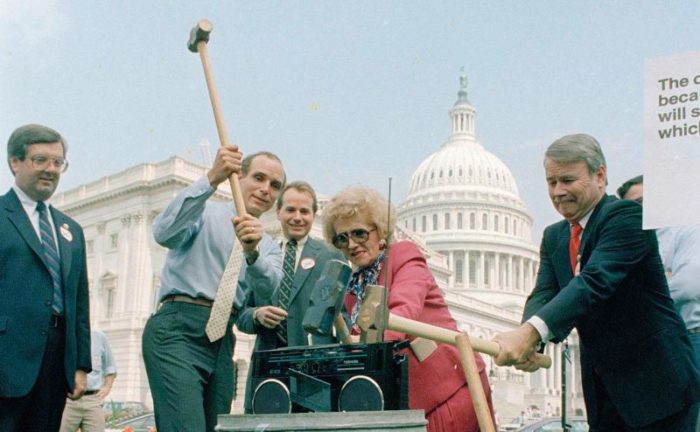Published in the Nikkei Asian Review 29/3/2028
Who said this?
“We have to stop flying that white flag and start running up the American flag and turn and fight and make America number one again in international commerce so that American jobs are filled in this country.”
No, it was not Donald Trump or his former advisor Steve Bannon, but Walter Mondale, the Democratic Party presidential candidate in 1984.
The 1980s were a period of escalating trade friction between the United States and the rising Asian power of the time, Japan. Indeed, the current stand-off between the U.S. and China seems a model of decorum compared with the bitter, racially charged rhetoric of 30 years ago.
Back then the term “populism” was rarely used, but politicians – often representing the rust-belt areas which were to vote Trump in 2016 – were quick to exploit economic insecurity. On a trip to Detroit, Speaker of the House Tip O’ Neill threatened to “fix the Japanese like they’ve never been fixed before.” Democratic congressman Jack Brooks opined that the U.S. should have dropped four nuclear bombs on Japan, not just two.
Just as today, there were concerns about industrial espionage; five Hitachi executives were arrested in an FBI sting relating to IBM technology. Fujitsu was blocked from acquiring Fairchild Semiconductor on national security grounds, even though the company was French-owned at the time. By the end of the decade Japan had replaced the Soviet Union in public opinion as the number one threat to the United States.
In the end Japan and the U.S. reached an accommodation, largely through Japanese concessions, and subsequently bilateral economic relations have been calm. Ultimately, this is what must happen with Sino-American economic relations. The two nations will construct a set of agreements and practices – effectively, a form of managed trade and investment – which offers a feasible modus vivendi.
Getting from here to there, though, may be a much more fractious process, depending on the levels of pragmatism and flexibility on both sides.
The U.S.-Japan trade disputes were handled by cool-headed professional negotiators. They took a dozen years to settle and had little discernible effect on global financial markets. This time we may not be so lucky. The parallels between then and now are instructive, but so are the differences.
Crucially, Japan was – and remains – a kind of U.S. protectorate, highly reliant on America for its security. China, on the other hand, has shown the willingness and capability to challenge the American military presence in the region. Simply put, Japan is a status quo power; China is not. That is likely to have a significant effect on negotiating postures.
Differences in the patterns of trade may work the other way. In contrast to 1980s corporate Japan, Chinese companies only rarely, as yet, compete head-to-head with American companies. And several well-known U.S. companies, from chip-makers to casino-operators, garner the majority of their revenue from China.
Many more, from Apple to Walmart, are reliant on Chinese supply chains. China is the U.S.’s third largest export destination, behind Mexico and Canada, and takes more American exports than Japan and Germany put together. Corporate America has much more to lose from a trade war this time – and thus more incentive to lobby against one.
That may be one reason why anti-Chinese sentiment has not yet permeated American culture to the extent that anti-Japanese sentiment did. Michael Crichton’s Rising Sun, a film and best-selling novel, depicted a nefarious Japanese plot to take control of American high-tech. When Sony did take over Columbia Pictures in 1989, Newsweek’s cover featured the Statue of Liberty in the guise of a geisha.
In today’s world, Chinese production companies have moved aggressively into financing Hollywood films – such as the Oscar-winning Darkest Hour – with no adverse publicity. Actor Richard Gere believes that China’s displeasure with his pro-Tibet sympathies has led to him being blackballed from major films, but there has been little outcry.
Japan continued to run current account surpluses and the U.S. current account deficits, but these are more related to macro-economic imbalances than trade practices. The point was that Japan and the U.S. were now stakeholders in each other’s economy.
A somewhat different menu would be required to put Sino-American relations on an even keel. Improved access to the Chinese market would have to be part of the solution. Likewise, a two-way street in acquisitions and investment, an end to hacking and theft of intellectual property and dumping by subsidized state-owned enterprises. The larger geopolitical context, including the future of North Korea, Taiwan and the South China Sea, would need to be addressed too.
Even with the best will in the world, reaching such an accommodation would be a decade-long process. In the meantime, the best we can hope for might be the economic equivalent of the Cold War doctrine of “Mutually Assured Destruction,” which ensured that nuclear weapons were built and maintained but never used. Despite the threats and posturing, there is ultimately too much at stake for anyone to press the red button.



